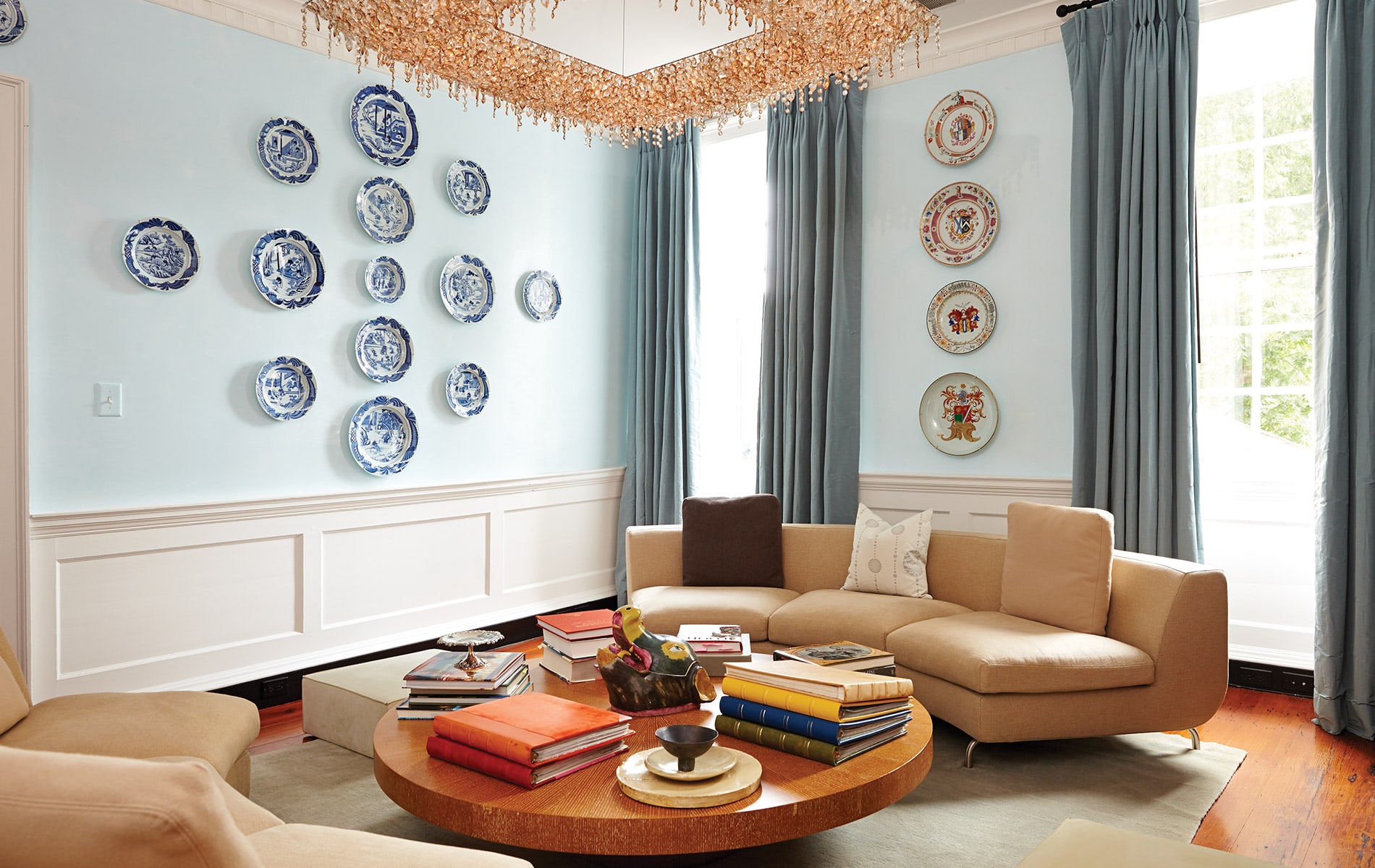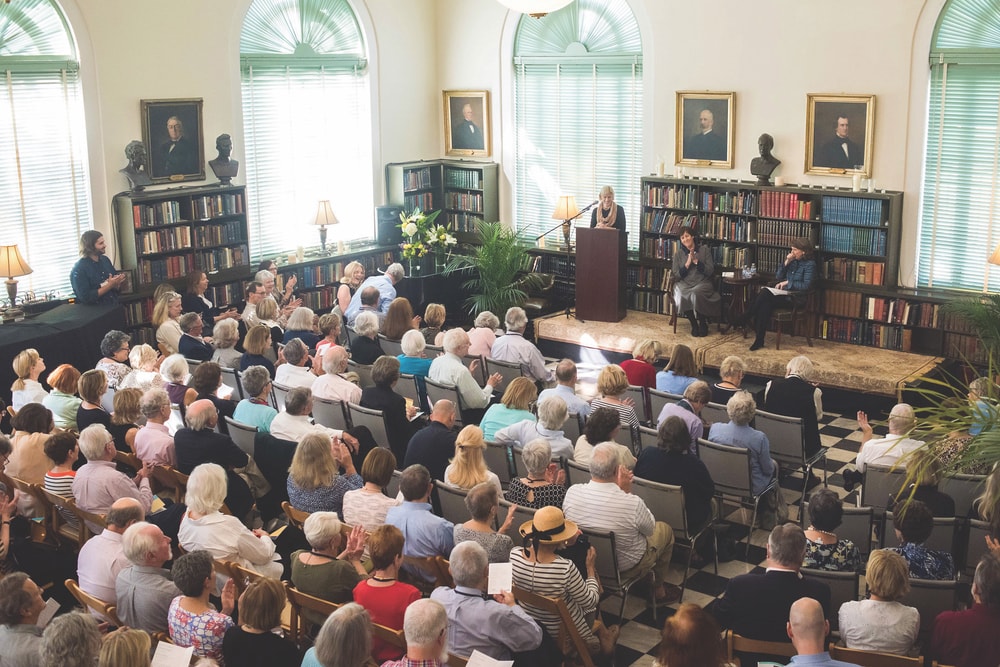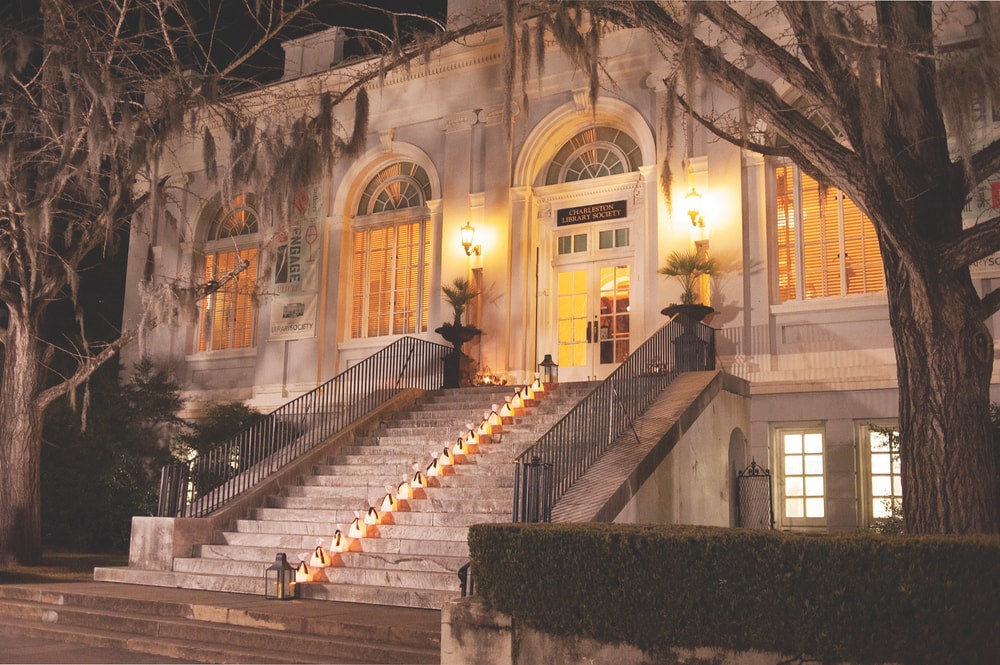
vie-magazine-suzanne-pollak-hero-min
Suzanne Pollak’s Rainbow Row living room in Charleston, South Carolina | Photo by Brie Williams
An Enlightened Affair
The Modern-Day Salon
By Suzanne Pollak | Main photo by Brie Williams
Born during the literary movements in seventeenth-century France, the salon is a gathering of intelligent, like-minded people to discuss cultural topics such as literature, art, philosophy, music, and beauty. Usually, there is a single host to conduct this exchange of ideas, opinions, and perspectives. As the interim director of the Charleston to Charleston Literary Festival, I am no stranger to the concept of the salon. In fact, I was a proponent, instigator, and organizer of salons even before I knew what they were. The very nature of a gathering of two or more people to discuss social themes always seems like a good idea to me. Reading books, listening to music, and looking at art can be fantastic shared experiences. I’ve experimented with all kinds of salons and finally discovered the ultimate kind: the only effort involved is to have a good time and the only objective is to expand the mind.
I experienced my first salon in the company of my brilliant father. His extensive collection of books and ten thousand records traveled all over Africa with us, carried from library to library, house to house, country to country. When my Dad came home from the embassy where he worked with the CIA, he relieved his brain of diplomatic duties by reading philosophy or reciting Shakespeare, solving complex calculus problems, or listening to Verdi operas, Mozart sonatas, or the Modern Jazz Quartet—while drinking a whiskey, of course. It’s astounding when I think of the trouble he took to transport these cultural objects every few years or months to a brand-new world. He carried his beloved collection around like a turtle carries its shell.
African music and art were embedded in my bones, but my father’s intellectual passions stirred my curiosity. What was it about the records, turntables, recording machines, and tapes that fed his soul? To find out, I came up with my first salon even though I did not know that’s what it was. I asked my father to listen to opera with me, and so we began. I thought he was obsessed and wondered if a person really needed ten versions of Don Giovanni. Can anyone actually tell the difference in who is singing? I learned the answers during our private salon afternoons in Monrovia, Liberia. I made cucumber sandwiches and tea because I thought that was an elegant thing to do while listening to music and reading librettos.

A salon in the Reading Room at the Charleston Library Society
Photo courtesy of CLS
High schools in Monrovia were not noted scholarly institutions, at least not in those days, so I attended a boarding school in New Hampshire. Culture shock ensued from temperatures dipping below my comfort level of ninety degrees to less than zero and mountains instead of flat Sahara surrounding me. Seeing snow for the first time made my head spin. Reserved New England personalities were a world apart from African exuberance, the architecture was completely different from what I had grown up with, and every aspect of life seemed foreign to me.
But my affinity for salons traveled with me to my new world. I invited new friends from Saint Paul’s School into the Old Chapel for an afternoon of talk and tea. Ours was a secret salon in a borrowed place, a space we had to sneak into. We stole snacks from a teacher’s lounge, drank hot tea from a Thermos, and talked about who knows what—some rubbish, I am sure. Once our activity was discovered, the Old Chapel doors were bolted except during worship services. The powers that be probably imagined we were drinking and doing drugs, not discussing our elevated eleventh-grade ideas.
My salon concepts lay dormant for decades while I raised my children, but the ideas sprang to life again for two reasons when we moved to Charleston, South Carolina. Not only did my three-centuries-old townhouse on Rainbow Row make the perfect setting for a salon, but I became friends with the ideal partner for one. The two of us even came up with the idea at the same time. My living room felt like old-world elegance meets hip-hop cool, an excellent place for ancient ideas to intertwine with new concepts. We used my upstairs living room with pale blue Venetian plaster walls decorated with a collection of eighteenth-century armorial Chinese porcelain. Two curved couches surrounded a round dining table chopped down to fifteen inches off the floor, and overhead was a spectacular contemporary crystal chandelier. This design made space for conversation, cocktails, and connection on a deep, meaningful level.
A new idea emerged: a modern-day salon series in beautiful spaces, organized by professionals, with intelligent authors, writers, and directors. Brain food galore!
My coconspirator and I decided seven was the perfect number of guests and implemented a rule that there were no spouses allowed. (We did not want the salon to turn into a cocktail party.) Two problems emerged: the spouses wondered why they were excluded, and word got around. Other people wanted to come. When friends asked if they could join, how could we tell them no? Our well-intentioned salon all of a sudden felt wrong, clubby, and exclusive, so we let it fizzle.
A new idea emerged: a modern-day salon series in beautiful spaces, organized by professionals, with intelligent authors, writers, and directors. Brain food galore! I’ve been missing the salons I grew up with, with an organized time, place, and participants but no organized agenda aside from the arts as a subject. A salon is not about changing the world (no politics); it’s about improving, expanding, and putting a spark in a person’s life so there is a future gathering to look forward to. It provides a place where one can get outside oneself, whether it’s once a month or once a year.

Front entrance of the Charleston Library Society
Photo courtesy of CLS
The Charleston Library Society is the perfect setting for a salon, and it will welcome the Charleston to Charleston Literary Festival in its Main Reading Room this November. The beauty of the architecture, the good weather, and the history of Charleston seem to provide all the culture one might need. The city is also walkable, with world-class dining and entertainment. Charleston to Charleston will take place at the Charleston Library Society from November 8 through 11 this year. The lovely beaux arts building (built circa 1912) on lower King Street serves as Charleston’s living room. Thursday, Friday, and Saturday nights are held in America’s oldest theater, the Dock Street Theatre. The roster of world-class authors and speakers includes Tina Brown, Earl Spencer (Princess Diana’s brother), John Avlon (CNN anchor) talking with Elliot Ackerman (novelist and former Marine), and Lynsey Addario (photojournalist); topics will range from Shakespeare to the impact and aftermath of World War I (this last will take place on the hundredth anniversary of Armistice Day).
The schedule of literary events is balanced with a series of stimulating social gatherings. Some parties are in private homes and historic spaces that have held gatherings for centuries. These venues set the stage for authors and attendees to mingle. The festival is a salon in the truest sense of the word. Authors and speakers don’t give lectures; instead, they have conversations on stage with another noted person, exchanging important ideas. Participants become part of the discussion by attending the sessions and social events, from book signings to parties at night (i.e., the opening night party in the CLS Reading Room hosted by VIE). What better way to make new friends and expand your horizons with new ideas?
— V —
To see the schedule and purchase tickets to the Charleston to Charleston Literary Festival, visit CharlestonToCharleston.com.
Suzanne Pollak, a mentor and lecturer in the fields of home, hearth, and hospitality, is the founder and dean of the Charleston Academy of Domestic Pursuits. She is the coauthor of Entertaining for Dummies, The Pat Conroy Cookbook, and The Charleston Academy of Domestic Pursuits: A Handbook of Etiquette with Recipes. Born into a diplomatic family, Pollak was raised in Africa, where her parents hosted multiple parties every week. Her South Carolina homes have been featured in the Wall Street Journal “Mansion” section and Town & Country magazine.
Share This Story!
KEEP UP WITH THE LATEST STORIES FROM VIE
















































































































































